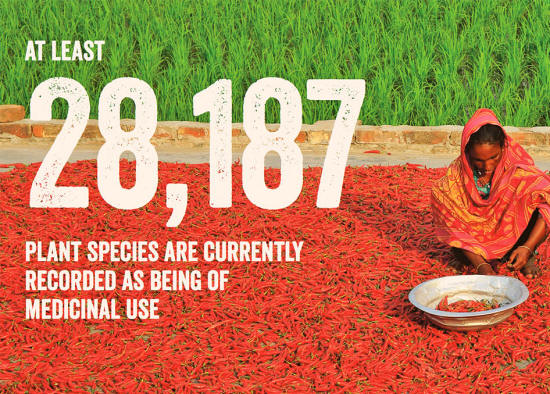|
from GreenMedInfo Website
reminds us that natural medicine was once, and still is, the default medical system
on this planet...
In fact, the use of synthetically produced patent medicines (pharmaceuticals) is a relatively recent development (Why Natural Medicine is NOT "Alternative" - circa 1870), and should really be called the "alternative medicine" vis-a-vis time-tested, far safer approaches that rely on food, spices, and carefully prepared and administered plant extracts.
A powerful new report (At Least 28,187 Plant Species are Currently Recorded as being of Medicinal Use) released by the Kew Gardens in the United Kingdom reveals that there are currently 28,187 plant species recorded as being of medicinal use throughout the world.
In addition, the report revealed that fewer than 16% (4,478) of the species used in plant-based medicines are cited in a medicinal regulatory publication.
While the lesser developed countries are the primary users of plant medicines, they are used in great abundance throughout the world.
Even in countries like Germany where conventional, drug-based medicine is the default approach, about 90% of their population also uses herbal medicines.
Even the most pharmaceutically obsessed country in the world, the United States, spent 17 billion dollars on traditional herbal medicines in 2000 alone, and the number has grown steadily since then.
It should be noted that mixing plant-based medicines with pharmaceuticals can be dangerous, and as the report points out, many of these plants contain compounds that can cause harm if taken incorrectly.
There is also a problem with misnaming or multiple names for the same plant-based medicines:
The report also pointed out that plants still provide the majority of lead compounds for drug development, with many still being directly extracted from medicinal plants:
In some sense, then, one can consider pharmaceutical medicine "plant-based," with the difference that their patent-based model almost invariably amplifies the toxic side effects to the patient.
The report also points out that presently, of the 5 drugs developmental specifically to treat the symptoms of Alzheimer's disease, two are derived from plants:
Another study mentioned in the report found that there are a staggering 656 flowering plant species used traditionally for diabetes, representing 437 genera and 111 families.
For instance, Metformin, probably the most well known drug for diabetes, was modeled after the anti-diabetic properties of Galega officinalis (goat's rue).
Unfortunately, even when a compound is isolated from a natural plant, it can lose its informational integrity, and may behave more like a chemical than a natural substance embedded within the synergistic context of the whole plant.
Let's Grow the Evidence Supporting Plant-Based Medicine!
As many know, this website was founded to create a central repository for research on the medicinal benefits of natural substances, including the thousands of plants presently used in culinary and herbal medicine applications.
Our mission is to help the public understand the profound value that plant medicine has in preventing and treating disease:
|


